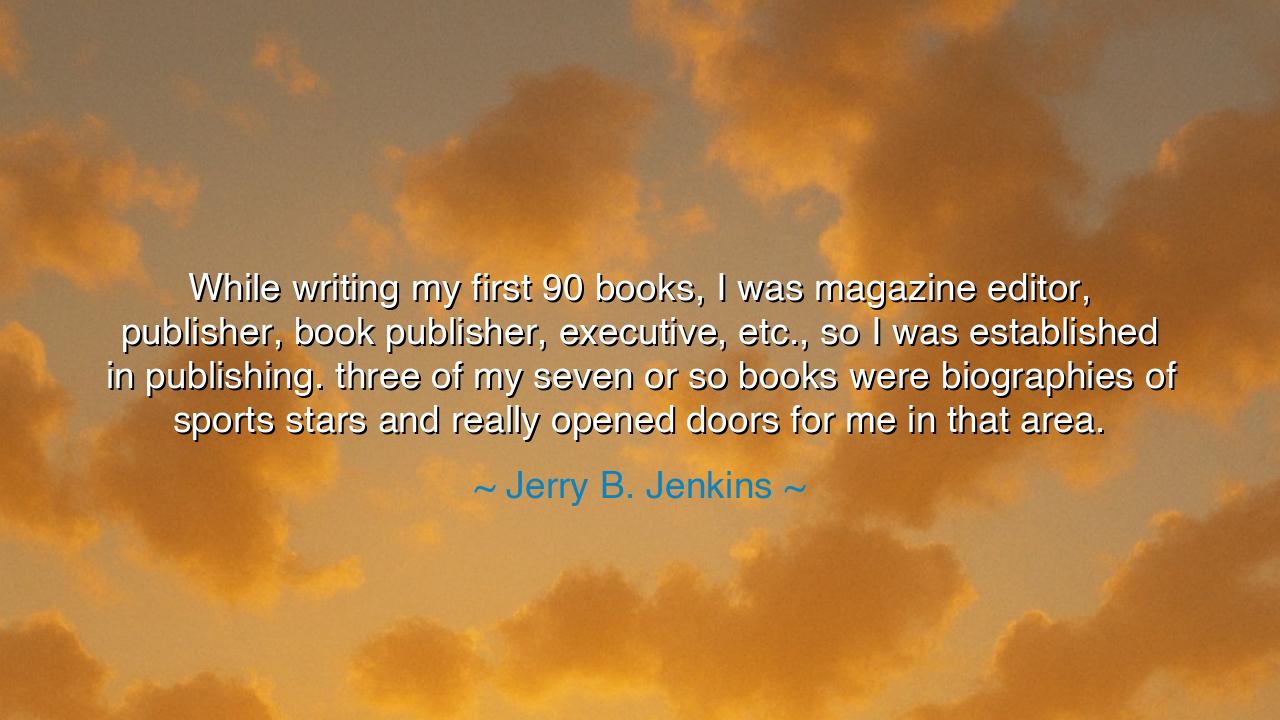
While writing my first 90 books, I was magazine editor
While writing my first 90 books, I was magazine editor, publisher, book publisher, executive, etc., so I was established in publishing. three of my seven or so books were biographies of sports stars and really opened doors for me in that area.






The words of Jerry B. Jenkins resound with the weight of labor and the dignity of perseverance: “While writing my first 90 books, I was magazine editor, publisher, book publisher, executive, etc., so I was established in publishing. Three of my seven or so books were biographies of sports stars and really opened doors for me in that area.” In this statement, we hear not the voice of sudden success, but of steady toil, the long march of a craftsman who built greatness word by word, page by page, while bearing many burdens. Jenkins reminds us that destiny is not delivered in an instant, but carved patiently through discipline and endurance.
The ancients taught that all things of worth demand years of hidden labor. The warrior trains long before his first battle, the mason shapes stone long before the temple rises, and the writer writes long before the world knows his name. Jenkins speaks of 90 books—a staggering number—and yet, during their creation, he also carried the weight of many roles: editor, publisher, executive. This is the truth of mastery: it is born not in leisure, but in struggle, when one labors beyond exhaustion and yet presses forward.
We are reminded of Virgil, who spent over a decade crafting the Aeneid, rewriting lines hundreds of times, perfecting not for applause but for truth. He, too, bore the weight of expectation, the pressure of empire, the demands of patron and people. Yet like Jenkins, he did not falter. He endured the long years of hidden labor, and from that crucible came words that echo even today. The path of both men shows us that greatness is a harvest sown in the soil of persistence.
Jenkins also reveals a lesson about doors: that sometimes the way forward opens not from grand design, but from humble beginnings. He wrote biographies of sports stars—works that, perhaps, he did not imagine would define him. Yet through them, opportunities arose, pathways opened, his voice reached new audiences. This is the wisdom of life: do not despise the small tasks, for they may become the stepping stones to destiny. The shepherd boy who slays a lion may one day face Goliath; the apprentice who shapes humble tools may one day craft the sword of kings.
There is humility in Jenkins’ reflection. He does not speak of fame or acclaim, but of being "established in publishing." He understood that the work itself—the steady practice of writing, editing, learning—was his true foundation. The ancients would have called this arete, the excellence born of virtue and practice. One who labors in obscurity with faithfulness is greater than one who waits idly for fortune. Jenkins, with his tireless hand, shows us the path of arete: to keep working, no matter how heavy the burden, until excellence becomes second nature.
The lesson is clear: do not seek quick triumph. Embrace the long journey. Write your 90 books, whatever they may be in your own life. Whether they are years of apprenticeship, months of study, or seasons of sacrifice, accept them as the soil in which your greatness will grow. And when smaller tasks appear—humble assignments, overlooked duties—embrace them too, for they may be the very doors that lead to your higher calling.
Practically, this means committing to daily labor. Write, even when unseen. Work, even when unpraised. Keep faith with your craft, your calling, your path. Record the hours, honor the process, and know that what seems small now may one day be revealed as the turning point of your journey. Like Jenkins, build your life not on sudden fortune but on the steady bricks of diligence.
So remember this teaching: greatness is not seized in a moment but earned across years of unseen toil. Be faithful in the small things, for they may open mighty doors. Let your life be like Jenkins’—a long obedience, a steady labor, a testament that through persistence and humility, the impossible becomes possible, and the ordinary becomes immortal.






AAdministratorAdministrator
Welcome, honored guests. Please leave a comment, we will respond soon